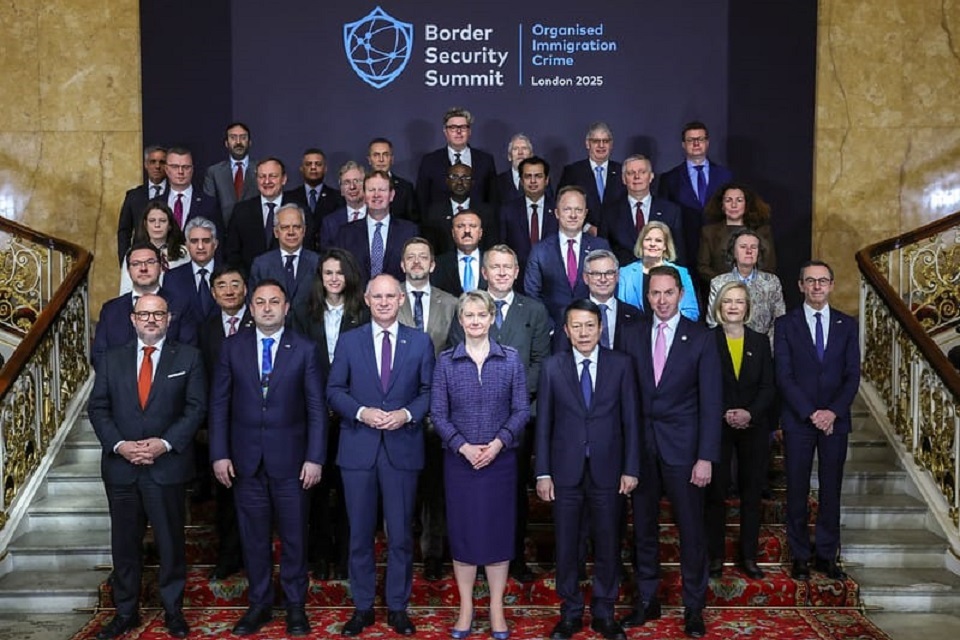The purpose of the Organised Immigration Crime Summit is to agree new action to tackle organised immigration crime (OIC) and boost border security.
Discussions at day 1 of the summit included
- tackling the supply chains and enablers of OIC
- the role of criminal finances in facilitating OIC
- the UK’s systems based approach to border security
as well as how countries can tackle organised crime groups’ operations online in relation to the advertising, promoting and facilitating of illegal immigration services.
The UK and allies including France, Iraq, Vietnam and the USA, and partners including the National Crime Agency (NCA) and representatives from social media organisations, met to agree actions to secure our collective borders, protect vulnerable people from exploitation, and tackle the global threat of organised immigration crime.
Unlike previous summits, this event engaged both European nations and key source and transit countries, as well as those that are integral to the supply of equipment, including small boats and engines, ensuring a broader, more comprehensive approach to tackling OIC.
Concrete outcomes have been agreed across Europe, Asia, Middle East, Africa, and North America to strengthen international partnerships to disrupt OIC networks. This also includes new joint work with France to tackle irregular migration in source and transit countries, through community outreach and bolstering false document detection capabilities to Iraqi officials.
The agreement represents a key step forward in the government’s Plan for Change to deliver on working people’s priorities to restore order to the immigration system and comes after the publication of new figures showing more than 24,000 people with no right to be here have been returned since the election – the highest rate of returns in 8 years.
A communiqué was issued that sets out how we will deepen our collaboration internationally to tackle this vile crime.
Home Secretary Yvette Cooper said
Organised immigration crime undermines our security and puts lives at risk. The criminal networks have spread across the globe and no single country can tackle this problem alone.
Today, at the Organised Immigration Crime Summit, the UK has led the way forward by securing international commitments to disrupt and pursue this vile criminal trade in people – part of our Plan for Change to strengthen our borders and keep communities safe.
Border Security Commander Martin Hewitt said
I have said since I came into my post as Border Security Commander that organised immigration crime requires a coordinated international response to effectively dismantle criminal networks.
In my role I have seen first-hand how the cruelty and greed of criminal gangs puts the lives of the most vulnerable at risk in dangerous small boat crossings all for financial gain.
This summit marks a step change in the international community’s approach to tackling the problem, presenting a critical opportunity to strengthen global cooperation, disrupt criminal networks, and prevent further loss of life.
Director General of the National Crime Agency (NCA) Graeme Biggar said
Criminal gangs are using sophisticated online tactics, the abuse of legitimate goods and services, and illicit financial networks to facilitate dangerous and illegal journeys which put thousands of lives at risk each year and undermine border security.
Today’s summit sets out international agreements to tackle an international problem.
International intelligence sharing and cooperation is absolutely crucial to track criminal activity across borders allowing us to put a stop to these dangerous criminals.
In addition, today the Home Secretary confirmed over £30 million in funding within the Border Security Command to tackle Organised Immigration Criminal Networks. This significant funding package will be spent on key security projects across Europe, the Western Balkans, Asia and Africa, designed to strengthen border security and combat international criminal smuggling gangs.
The Home Secretary also announced joint work with France to fund an additional grassroots engagement programme to educate local communities on the dangers of irregular migration and people smuggling gangs, raising awareness of the realities and difficulties with travelling to Northern France to cross the Channel to the UK.
This will target both potential irregular migrants and, for the first time, teachers, religious leaders, and family members within vulnerable communities, and builds on the Home Office digital deterrence comms campaign that is already running in the Kurdistan Region of Iraq.
The UK will also collaborate with France to deliver critical training to Iraqi officials and commercial transport staff, helping them detect fraudulent documents and passports used to facilitate irregular migration and OIC activities.

